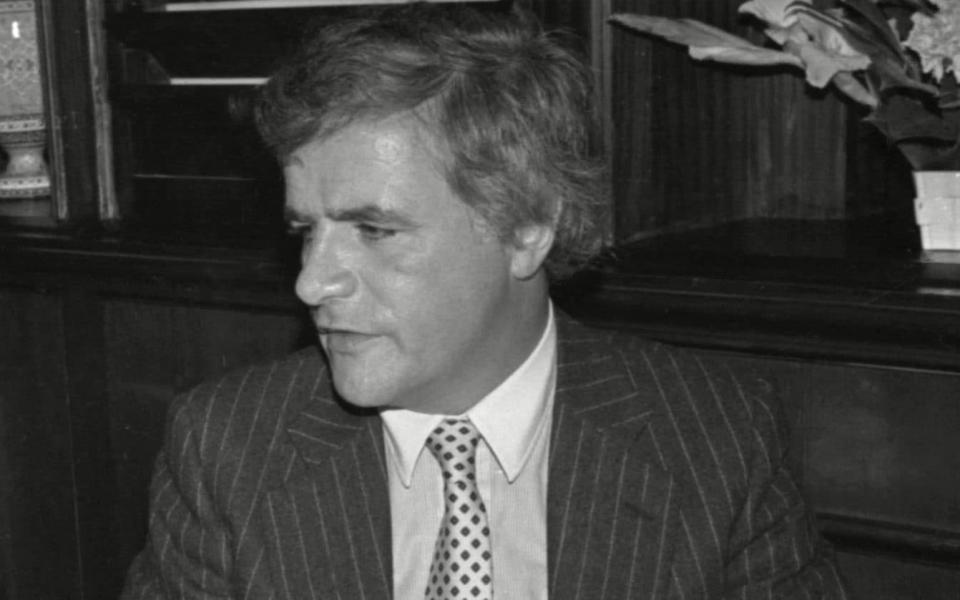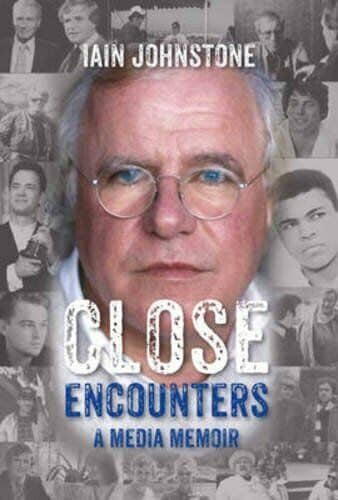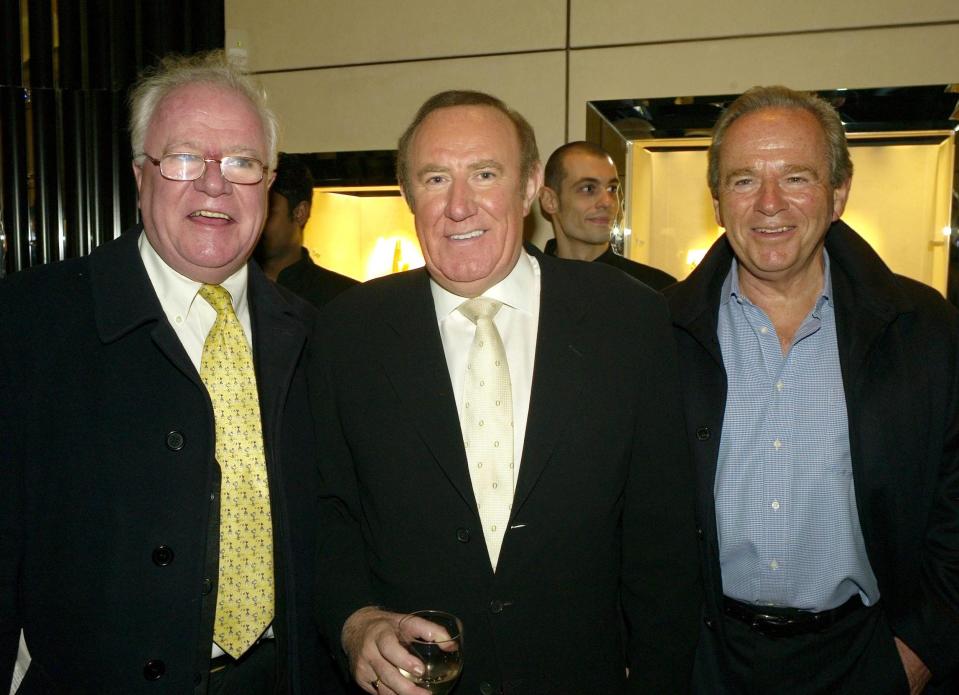Iain Johnstone, broadcaster, critic and brilliant interviewer of Hollywood stars – obituary

Iain Johnstone, who has died aged 80, was a television producer, journalist, critic, and biographer of Hollywood stars, many of whom he interviewed on BBC programmes like The Movies and Film Night.
Johnstone’s lifelong passion was films, and making television films about films and film stars. Invariably working as a multi-faceted freelance, he considered that he had spread himself too thinly, musing in his memoir Close Encounters (2014) that had he stuck to one trade and truly mastered it, he would have made a more memorable mark.
While still in his twenties, he persuaded Barry Norman to leave Fleet Street to present Film 72, which became the longest-running networked arts programme on television. But Johnstone was also adept at TV interviewing on his own account, and from the late 1960s he brought stars including Sean Connery, Meryl Streep, Barbra Streisand, James Stewart, Richard Burton and Woody Allen to British screens.
When Barry Norman took a year out in 1982, Johnstone took his place on Film 82 (BBC One), squirming his way through an interview with an often monosyllabic Paul Newman: the American star, as one critic noted, exhibited all the verve and personality of a glass of water.
More successful was Johnstone’s documentary about Dustin Hoffman, who was in Cornwall shooting Straw Dogs (1971), having been acclaimed for his starring film role in The Graduate (1967). Hoffman told Johnstone that having read the novel, he had felt that he, as a short, Jewish actor, was wrong for the eponymous part of tall, preppy Benjamin Braddock, and told the director Mike Nichols so. “Well, inside, Benjamin Braddock is short and Jewish,” Nichols replied. The role earned Hoffman an Oscar nomination and Johnstone went on to write a biography of Hoffman in 1984.
Other filmed encounters included one with John Wayne, whom he interviewed in Mexico aboard Wayne’s converted minesweeper in Acapulco Bay, and Telly Savalas, then starring on television as the New York cop Kojak, whom he filmed at the wheel of his silver Rolls-Royce while smoking, drinking, reading a magazine and twisting round in his seat to mug for the camera.

In 1977 Johnstone landed an interview with the notoriously publicity-shy novelist Alistair MacLean. In 1981 he produced Snowdon on Camera, a Bafta-nominated documentary mini-series for BBC Two about the photographer Lord Snowdon (by then divorced from Princess Margaret). And for a Film 82 special he secured a rare extended interview with a relaxed Jack Nicholson discussing his friendship with Marlon Brando and his early career choices, such as why he had no regrets about having turned down lead roles in The Godfather and The Sting.
The son of a postmaster, Iain Gilmour Johnstone was born on April 8 1943 in Reading. On his father’s appointment as Postmaster Controller Northern Ireland, the family moved to Belfast, where Iain was educated at Campbell College.
While reading law at Bristol University he worked for BBC’s regional news programme Points West, and on graduating joined ITN, reading the late news bulletins, before returning to the BBC. An early assignment was Points Of View, a weekly five-minute filler of viewers’ opinions on BBC Television output, presented by Robert Robinson.
In 1969 Johnstone interviewed the director Billy Wilder for The Movies series while he was in London shooting The Private Lives of Sherlock Holmes (1970). He was deputy editor on the nightly current affairs programme 24 Hours, oversaw the BBC coverage of the Watergate hearings in 1973, and produced The Frost Interview (1974), including one item filmed in a boxing ring with the world heavyweight champion Muhammad Ali.
In 1973 Johnstone left the BBC to lecture in media studies at Boston University, where he heard that Steven Spielberg was shooting Jaws at Martha’s Vineyard. Johnstone made a 10-minute television film, The Jaws Report, for the BBC, one of eight he would make about the director’s works, including Jurassic Park and War of the Worlds.
While producing David Frost in The Frost Programme, Johnstone met Harold Wilson and invited the former prime minister to host two editions of Friday Night, Saturday Morning, a late-night chat show on BBC Two. In the production gallery, Johnstone realised that Wilson was no interviewer and was running out of something – anything – to ask his guests, including the comedian and singer Harry Secombe, who started whistling to himself to fill the silences. Only a ruthless, manic edit by Johnstone averted disaster.
Johnstone’s 1977 film portrait of Clint Eastwood, The Man With No Name, drew a remarkable 11 million-plus viewers. His 1979 TV documentary about the Monty Python team as they made The Life of Brian sealed a friendship with John Cleese, and in 1988 he filmed the making of A Fish Called Wanda.
Having worked as film critic of The Sunday Times since 1983, Johnstone resigned to write a film script with Cleese, Fierce Creatures (1997), starring Cleese, Kevin Cline, Jamie Lee Curtis and Michael Palin. “Unmemorable” – the Telegraph’s verdict, under the headline “Don’t Mention The Film” – was perhaps the least worst.

Johnstone’s 1975 documentary about the shooting of Richard Attenborough’s film A Bridge Too Far was the subject of his first book, The Arnhem Report. Robert Redford used the lens of Johnstone’s camera before he led a daring canoe crossing of the Rhine, earning Attenborough’s ire: “Can’t you understand? Redford’s meant to be a butch soldier and you show him checking his make-up. Now piss off.”
As well as his memoir Johnstone published three novels including Pirates of the Mediterranean (2010). His best friend and former ITN colleague Richard Whiteley, later host of Channel 4’s Countdown (they were best man at each other’s weddings, and Johnstone took him to Ibiza on his second honeymoon), was the subject of Johnstone’s biography, Richard by Kathryn, co-written with Whiteley’s partner Kathryn Apanowicz in 2006.
Latterly Johnstone used his legal training to become a commercial mediator in cases where litigants in disputes dispense with lawyers.
Iain Johnstone’s first marriage to Renate Kohler in 1972 ended in divorce. In 1980 he married Mo Watson, a script supervisor, who survives him with their two daughters and a son.
Iain Johnstone, born April 8 1943, died May 4 2023

 Yahoo News
Yahoo News 